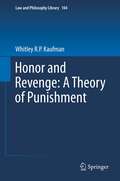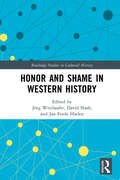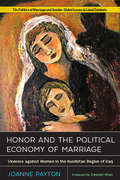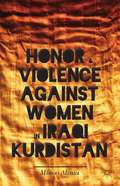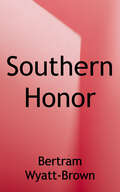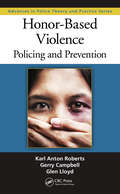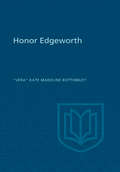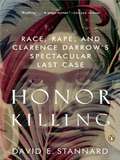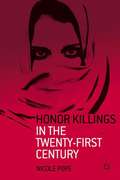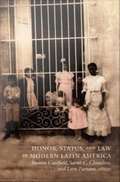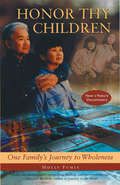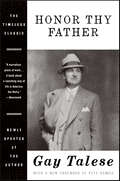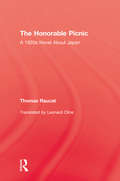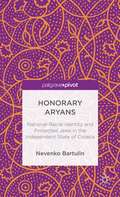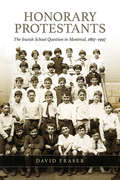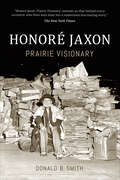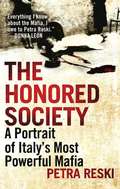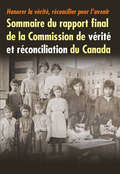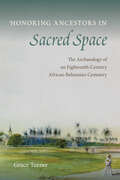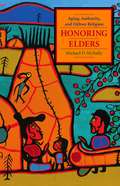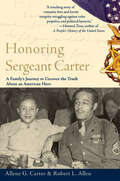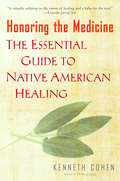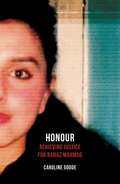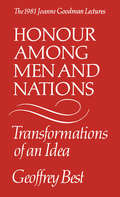- Table View
- List View
Honor and Revenge: A Theory of Punishment
by Whitley R.P. KaufmanThis book addresses the problem of justifying the institution of criminal punishment. It examines the "paradox of retribution": the fact that we cannot seem to reject the intuition that punishment is morally required, and yet we cannot (even after two thousand years of philosophical debate) find a morally legitimate basis for inflicting harm on wrongdoers. The book comes at a time when a new "abolitionist" movement has arisen, a movement that argues that we should give up the search for justification and accept that punishment is morally unjustifiable and should be discontinued immediately. This book, however, proposes a new approach to the retributive theory of punishment, arguing that it should be understood in its traditional formulation that has been long forgotten or dismissed: that punishment is essentially a defense of the honor of the victim. Properly understood, this can give us the possibility of a legitimate moral justification for the institution of punishment.
Honor and Shame in Western History (Routledge Studies in Cultural History)
by Jörg Wettlaufer David Nash Jan Frode HatlenThis book covers a wide range of topics related to honor and shame in European historical societies: history of law and literature, social and ancient history, as well as theoretical contributions on the state of research and the importance of honor and shame in traditional societies. Honor and shame in Western History brings together 14 texts of interdisciplinary scholars from Europe and North America. It covers a wide range of topics related to honor and shame in historical societies. The contributions cover periods of Western history from Greek and Roman times to the nineteenth century and many of them integrate the concept of a "deep history" of honor and shame in social interaction. The book is essential for a broad audience interested in social history and the history of emotions.
Honor and the Political Economy of Marriage: Violence against Women in the Kurdistan Region of Iraq (Politics of Marriage and Gender, Global)
by Joanne Payton'Honor' is used as a justification for violence perpetrated against women and girls considered to have violated social taboos related to sexual behavior. Several ‘honor’-based murders of Kurdish women, such as Fadime Sahindal, Banaz Mahmod and Du’a Khalil Aswad, and campaigns against 'honor'-based violence by Kurdish feminists have drawn international attention to this phenomenon within Kurdish communities. Honor and the Political Economy of Marriage provides a description of ‘honor’-based violence that focuses upon the structure of the family rather than the perpetrator’s culture. The author, Joanne Payton, argues that within societies primarily organized by familial and marital connections, women’s ‘honor’ is a form of symbolic capital within a ‘political economy’ in which marriage organizes intergroup connections. Drawing on statistical analysis of original data contextualized with historical and anthropological readings, Payton explores forms of marriage and their relationship to ‘honor’, sketching changing norms around the familial control of women from agrarian/pastoral roots to the contemporary era.
Honor And Violence Against Women In Iraqi Kurdistan
by Minoo AliniaThis book examines violence against women in the name of honor in Iraqi Kurdistan, taking an intersectional perspective. It reveals the links between destructive, state-sanctioned honor discourse and notions of manhood as they are shaped by a resistance culture dedicated to the struggle against ethnic oppression.
Honor and Violence in the Old South
by Bertram Wyatt-BrownHailed as a classic by reviewers and historians, Bertram Wyatt-Brown's Southern Honor now appears in abridged form under the title Honor and Violence in the Old South. <p><p>The first major reinterpretation of southern life and custom since W.J. Cash's The Mind of the South, this work explores the meaning and expression of the ancient code of honor as whites—both slaveholders and non-slaveholders—applied it to their lives. Wyatt-Brown argues persuasively that southern ethical habits and traditions are the basis of regional distinctiveness and helped to justify the South's most cherished peculiarity: the institution of slavery. <p><p>Using both literature and anthropology in innovative ways, he shows how honor affected family loyalty and community defensiveness. The work begins with a study of Hawthorne's famous story of a tar-and-feathering, "My Kinsman, Major Molineux," and it ends with an authentic lynching, an absorbing and chilling example of a public shaming ritual. Between these studies of fictional and historical violence, Wyatt-Brown deals with such wide-ranging topics as childbearing, marital patterns, gentility, legal traditions, duelling, hospitality, slave discipline, lynch-law, and insurrectionary panic-all of which gave white southerners a special sense of themselves. Book jacket.
Honor-Based Violence: Policing and Prevention (Advances in Police Theory and Practice)
by Karl Anton Roberts Gerry Campbell Glen LloydHonor-based violence (HBV) is a crime committed to protect or defend the honor of a family and/or a community. It is usually triggered by the victim‘s behavior, which the family and/or community regards as causing offense or dishonor. HBV has existed for thousands of years but has only very recently become a focus of law enforcement, policy makers,
Honor Edgeworth
by Douglas Lochhead Kate Madeleine BottomleyIn Honor Edgeworth the sole and sincere motive of the authoress has been to hold up to the mass the little picture of society, in one of its most marked phases, that she has sketched, as she watched its freaks and caprices from behind the scenes.Ottawa, in this work, is taken merely as a representative of all other fashionable cities, for the simple reason that it is better known to the writer than any other city of social repute. Her object in publishing the volume at all, if not clearly defined throughout the work, may be discovered here: it is primarily, to attract the attention of those who, if they wished, could exercise a beneficial influence over the sphere in which they live, to the moral depravities that at present are allowed so passively to float on the surface of the social tide. It would with the same word appeal to the minds and hearts of those women who are satisfied to remain slaves to the exactions of an unscrupulous society, at the sacrifice of their most womanly impulses, and their noblest energies; and would also remind some reckless sons of Ottawa, of how miserably they are contributing towards the future prosperity of their country, by adopting, as the only aim of their lives, the paltry ambition of an unworthy self-indulgence.The predominant feeling throughout the entire composition has been one of pure philanthropy, as the authoress desires to benefit her fellow-creatures, in as far as it lies in her very limited power.
Honor Killing
by Stannard David E.In the fall of 1931, Thalia Massie, the bored, aristocratic wife of a young naval officer stationed in Honolulu, accused six nonwhite islanders of gang rape. The ensuing trial let loose a storm of racial and sexual hysteria, but the case against the suspects was scant and the trial ended in a hung jury. Outraged, Thalia’s socialite mother arranged the kidnapping and murder of one of the suspects. In the spectacularly publicized trial that followed, Clarence Darrow came to Hawai’i to defend Thalia’s mother, a sorry epitaph to a noble career. It is one of the most sensational criminal cases in American History, Stannard has rendered more than a lurid tale. One hundred and fifty years of oppression came to a head in those sweltering courtrooms. In the face of overwhelming intimidation from a cabal of corrupt military leaders and businessmen, various people involved with the case—the judge, the defense team, the jurors, a newspaper editor, and the accused themselves—refused to be cowed. Their moral courage united the disparate elements of the non-white community and galvanized Hawai’i’s rapid transformation from an oppressive white-run oligarchy to the harmonic, multicultural American state it became. Honor Killing is a great true crime story worthy of Dominick Dunne—both a sensational read and an important work of social history .
Honor Killings in the Twenty-First Century
by Nicole PopeThousands of women are murdered every year by close relatives for allegedly violating an unwritten social code or rebelling against the patriarchal order. The book examines the roots and evolution of honor-based violence, as well as the ongoing struggle to eradicate it worldwide.
Honor, Status, and Law in Modern Latin America
by Sueann Caulfield Sarah C. Chambers Lara PutnamThis collection brings together recent scholarship that examines how understandings of honor changed in Latin America between political independence in the early nineteenth century and the rise of nationalist challenges to liberalism in the 1930s. These rich historical case studies reveal the uneven processes through which ideas of honor and status came to depend more on achievements such as education and employment and less on the birthright privileges that were the mainstays of honor during the colonial period. Whether considering court battles over lost virginity or police conflicts with prostitutes, vagrants, and the poor over public decorum, the contributors illuminate shifting ideas about public and private spheres, changing conceptions of race, the growing intervention of the state in defining and arbitrating individual reputations, and the enduring role of patriarchy in apportioning both honor and legal rights. Each essay examines honor in the context of specific historical processes, including early republican nation-building in Peru; the transformation in Mexican villages of the cargo system, by which men rose in rank through service to the community; the abolition of slavery in Rio de Janeiro; the growth of local commerce and shifts in women's status in highland Bolivia; the formation of a multiethnic society on Costa Rica's Caribbean coast; and the development of nationalist cultural responses to U. S. colonialism in Puerto Rico. By connecting liberal projects that aimed to modernize law and society with popular understandings of honor and status, this volume sheds new light on broad changes and continuities in Latin America over the course of the long nineteenth century. Contributors. Jos Amador de Jesus, Rossana Barragn, Sueann Caulfield, Sidney Chalhoub, Sarah C. Chambers, Eileen J. Findley, Brodwyn Fischer, Olvia Maria Gomes da Cunha, Laura Gotkowitz, Keila Grinberg, Peter Guardino, Cristiana Schettini Pereira, Lara Elizabeth Putnam
Honor Thy Children: One Family's Journey to Wholeness
by Molly FumiaExperience this gripping true story of a Japanese American family’s transformation from brokenness to wholeness in the face of tragedy.The inspirational account of a Japanese-American family’s triumph after grappling with the death of their three children—two from AIDS and a third the victim of a tragic drive-by shooting—Honor Thy Children chronicles the creation, devastation, and remarkable resurrection of the Nakatanis, who journey from unimaginable grief to healing.Praise for Honor Thy Children“This is a story that will break your heart and make it whole again. It will bring you into a realm of humanness and compassion you didn’t know you had. It might even set you free to love in ways you’ve never loved before.” —Sister Helen Prejean, #1 New York Times-bestselling author of Dead Man Walking“I have never read such a powerful story about a Japanese American family like this before. It relates a universal message of the deep love the Nakatanis have for their children which transcended alienation and despair…. It is the Nakatanis enduring legacy of love and hope to the world.” —Ford H. Kuramoto, national director, National Asian Pacific American Families Against Substance Abuse
Honor Thy Father
by Gay TaleseA classic masterwork newly updatedThe electrifying true story of the rise and fall of New York's notorious Bonanno crime familyOn New York's Park Avenue on a rainy Tuesday night in October 1964, the famous Mafia chieftain Joseph Bonanno was kidnapped by two mobsters and reported by the police as dead on the following morning. More than a year later, Bonanno mysteriously reappeared, setting off a bloody mob feud that came to be known as the “Banana War.”In this monumental work—packed with intimate details and brilliant reporting—bestselling author Gay Talese first brought to the American consciousness a world and a life previously known to only a few. No other book has done more to acquaint readers with the secrets, structure, wars, power plays, family lives, and fascinating, frightening personalities of the Mafia.
Honor, Vengeance, and Social Trouble: Pardon Letters in the Burgundian Low Countries
by Walter Prevenier Peter ArnadeAmong the more intriguing documentary sources from late medieval Europe are pardon letters--petitions sent by those condemned for serious crimes to monarchs and princes in France and the Low Countries in the hopes of receiving a full pardon. The fifteenth-century Burgundian Low Countries and duchy of Burgundy produced a large cache of these petitions, from both major cities (Bruges, Ghent, Antwerp, and Dijon) and rural communities. In Honor, Vengeance, and Social Trouble, Peter Arnade and Walter Prevenier present the first study in English of these letters to explore and interrogate the boundaries between these sources' internal, discursive properties and the social world beyond the written text.Honor, Vengeance, and Social Trouble takes the reader out onto the streets and into the taverns, homes, and workplaces of the Burgundian territories, charting the most pressing social concerns of the day: everything from family disputes and vendettas to marital infidelity and property conflicts--and, more generally, the problems of public violence, abduction and rape, and the role of honor and revenge in adjudicating disputes. Arnade and Prevenier examine why the right to pardon was often enacted by the Burgundian dukes and how it came to compete with more traditional legal means of resolving disputes. In addition, they consider the pardon letter as a historical source, highlighting the limitations and pitfalls of relying on documents that are, by their very nature, narratives shaped by the petitioner to seek a favored outcome. The book also includes a detailed case study of a female actress turned prostitute. An example of microhistory at its best, Honor, Vengeance, and Social Trouble will challenge scholars while being accessible to students in courses on medieval and early modern Europe or on historiography.
Honorable Picnic: A 1920s Novel About Japan
by RaucatFirst published in 2010. Routledge is an imprint of Taylor & Francis, an informa company.
Honorary Aryans: National–Racial Identity and Protected Jews in the Independent State of Croatia
by Nevenko BartulinBetween 1941 and 1945, in one of the more curious episodes of racial politics during the Second World War, a small number of Jews were granted the rights of Aryan citizens in the Independent State of Croatia by the pro-Nazi Utasha regime. This study seeks to explain how these exemptions from Ustasha racial laws came to be, and in particular how they were justified by the race theory of the time. Author Nevenko Bartulin explores these questions within the broader histories of anti-Semitism, nationalism, and race in Croatia in the late nineteenth and early twentieth century, tracing Croatian Jews' troubled journey from "Croats of the Mosaic faith" before World War II to their eventual rejection as racial aliens by the Utasha movement.
Honorary Protestants
by David Fraser The Osgoode SocietyWhen the Constitution Act of 1867 was enacted, section 93 guaranteed certain educational rights to Catholics and Protestants in Quebec, but not to any others. Over the course of the next century, the Jewish community in Montreal carved out an often tenuous arrangement for public schooling as "honorary Protestants," based on complex negotiations with the Protestant and Catholic school boards, the provincial government, and individual municipalities. In the face of the constitution's exclusionary language, all parties gave their compromise a legal form which was frankly unconstitutional, but unavoidable if Jewish children were to have access to public schools. Bargaining in the shadow of the law, they made their own constitution long before the formal constitutional amendment of 1997 finally put an end to the issue.In Honorary Protestants, David Fraser presents the first legal history of the Jewish school question in Montreal. Based on extensive archival research, it highlights the complex evolution of concepts of rights, citizenship, and identity, negotiated outside the strict legal boundaries of the constitution.
Honoré Jaxon: Prairie Visionary
by Donald SmithBorn in 1861 to a Methodist family, William Henry Jackson grew up in Ontario before moving to Prince Albert, Saskatchewan, where he sympathized with the Métis and became personal secretary to Louis Riel. After the Métis defeat a Regina court committed the young English Canadian idealist to the lunatic asylum at Lower Fort Garry. He eventually escaped to the United States, joined the labour union movement, and renounced his race. Self-identifying as Métis, he changed his name to the French-sounding “Honoré Jaxon” and devoted the remainder of his life to fighting for the working class and the Indigenous peoples of North America. In Honoré Jaxon, Donald B. Smith draws on extensive archival research and interviews with family members to present a definitive biography of this complex political man. The book follows Jaxon into the 1940s, where his life mission became the establishment of a library for the First Nations in Saskatchewan, collecting as many books, newspapers, and pamphlets relating to the Métis people as possible. In 1951, at age ninety, he was evicted from his apartment and his library discarded to the New York City dump. In poor health and broken in spirit, he died one month later. Heavily illustrated, Honoré Jaxon recounts the complicated story of a young English Canadian who imagined a society in which English and French, Indigenous and Métis would be equals.
The Honored Society: A Portrait of Italy's Most Powerful Mafia
by Petra ReskiIn the early hours of an August 2007 morning a gunfight broke out in an Italian restaurant in Duisburg, Germany; in less than five minutes over seventy shots were fired into the bodies of six men. Both the victims and the assassins were members of the 'Ndrangheta crime organization. Calabria's Mafia had brazenly shown its savage influence outside Italy for the first time.In The Honored Society award-winning investigative reporter Petra Reski reveals the Mafia menace lurking throughout the world- from espresso bars in Palermo to European halls of parliament to the corporate headquarters of enormous agricultural firms. In haunting and exquisite prose she explores the Byzantine structure of the 'Ndrangheta, Cosa Nostra and other mafia clans throughout Italy - the code they live by, the destruction they wreak, how they operate within the country and how they operate internationally. She shows how these syndicates dominate everything from nuclear waste disposal to hotel chains to the marijuana trade in Australia and cocaine trafficked throughout the world. Reski shows how figures such as Silvio Berlusconi were made by the Mafia, and how those who dared to defy its codes were broken. A searing portrait of the criminals who have come to control not only Italy but vast swathes of the globe, The Honored Society is a journalistic tour de force.
Honorer la vérité, réconcilier pour l’avenir
by Commission de vérité et réconciliation du CanadaEntre 1867 et 2000, le gouvernement canadien a placé plus de 150 000 enfants autochtones dans des pensionnats d'un bout à l'autre du pays. <P><P>Les autorités gouvernementales et les missionnaires étaient d'avis qu'afin de « civiliser et de christianiser » les enfants autochtones, il fallait les éloigner de leurs parents et de leur communauté d'origine respective. <P> La vie de ces enfants au pensionnat était empreinte de solitude et d'exclusion. La discipline y était stricte et le déroulement du quotidien, lui, fortement régenté. Les langues et les cultures autochtones étaient dénigrées et réprimées. L'éducation et la formation technique prenaient trop souvent la forme de corvées et de tâches ménagères assurant l'autonomie des pensionnats. La négligence à l'égard des enfants fut institutionnalisée et le manque de supervision donna lieu à des situations où les élèves furent victimes de sévices physiques et sexuels. <P> Une poursuite judiciaire déposée par les anciens pensionnaires a mené, en 2008, à la mise sur pied de la Commission de vérité et réconciliation du Canada. Étant l'aboutissement de plus de six ans de recherche, le rapport final de la Commission présente l'histoire des pensionnats ainsi que leur héritage, et trace la voie de la réconciliation. <P> Honorer la vérité, réconcilier pour l'avenir résume les six volumes constituant le rapport final de la Commission. Il assimile les pensionnats à l'instrument d'un génocide culturel et indique, par le fait même, que ces pensionnats s'inscrivaient dans le cadre plus large de la politique colonialiste du gouvernement canadien à l'égard des peuples autochtones. <P> Le rapport établit de quelle façon le sous-financement chronique a mené à des conditions de vie malsaines et à des taux de mortalité bien plus élevés que ceux caractérisant le reste de la population canadienne d'âge scolaire. De plus, il indique clairement que le gouvernement avait été avisé des conséquences de ses politiques et que d'autres options lui avaient été proposées, options qu'il a choisi d'ignorer et qui auraient pourtant réduit le taux de mortalité au sein des pensionnats. Les perturbations que ces pensionnats ont causées aux élèves autochtones, à leur famille et aux collectivités sont encore palpables à ce jour. Elles se mesurent par la perte des langues et des liens familiaux dans les communautés autochtones, ainsi que par les écarts qui continuent de séparer les Autochtones et les non-Autochtones du Canada sur les plans de la santé, de l'éducation et de l'emploi. La réconciliation permettra de reconnaître que les pensionnats faisaient partie d'un ensemble plus large de politiques visant à priver les Autochtones de leurs terres, de leur culture, de leur vie spirituelle et de leurs propres gouvernements. Les quatre-vingt-quatorze appels à l'action de la Commission établissent des mesures concrètes à appliquer pour réparer la relation tourmentée qui unit les peuples autochtones à la Couronne, et pour établir des rapports harmonieux entre Autochtones et non-Autochtones.
Honoring Ancestors in Sacred Space: The Archaeology of an Eighteenth-Century African-Bahamian Cemetery (Florida Museum of Natural History: Ripley P. Bullen Series)
by Grace TurnerThe Anglican Church established St. Matthew's Parish on the eastern side of Nassau to accommodate a population increase after British Loyalists migrated to the Bahamas in the 1780s. The parish had three separate cemeteries: the churchyard cemetery and Centre Burial Ground were for whites, but the Northern Burial Ground was officially consecrated for nonwhites in 1826 by the Bishop of Jamaica. In Honoring Ancestors in Sacred Space, Grace Turner posits that the African-Bahamian community intentionally established this separate cemetery in order to observe non-European burial customs. Analyzing the landscape and artifacts found at the site, Turner shows how the community used this space to maintain a sense of social and cultural belonging despite the power of white planters and the colonial government.Although the Northern Burial Ground was covered by storm surges in the 1920s, and later a sidewalk was built through the site, Turner's fieldwork reveals a wealth of material culture. She points to the cemetery's location near water, trees planted at the heads of graves, personal items left with the dead, and remnants of food offerings as evidence of mortuary practices originating in West and Central Africa. According to Turner, these African-influenced ways of memorializing the dead illustrate W. E. B. Du Bois's idea of "double consciousness"--the experience of existing in two irreconcilable cultures at the same time. Comparing the burial ground with others in Great Britain and the American colonies, Turner demonstrates how Africans in the Atlantic diaspora did not always adopt European customs but often created a separate, parallel world for themselves. A volume in the Florida Museum of Natural History: Ripley P. Bullen Series
Honoring Elders: Aging, Authority, and Ojibwe Religion (Religion and American Culture)
by Michael D. McNallyLike many Native Americans, Ojibwe people esteem the wisdom, authority, and religious significance of old age, but this respect does not come easily or naturally. It is the fruit of hard work, rooted in narrative traditions, moral vision, and ritualized practices of decorum that are comparable in sophistication to those of Confucianism. Even as the dispossession and policies of assimilation have threatened Ojibwe peoplehood and have targeted the traditions and the elders who embody it, Ojibwe and other Anishinaabe communities have been resolute and resourceful in their disciplined respect for elders. Indeed, the challenges of colonization have served to accentuate eldership in new ways.Using archival and ethnographic research, Michael D. McNally follows the making of Ojibwe eldership, showing that deference to older women and men is part of a fuller moral, aesthetic, and cosmological vision connected to the ongoing circle of life-a tradition of authority that has been crucial to surviving colonization. McNally argues that the tradition of authority and the authority of tradition frame a decidedly indigenous dialectic, eluding analytic frameworks of invented tradition and naïve continuity. Demonstrating the rich possibilities of treating age as a category of analysis, McNally provocatively asserts that the elder belongs alongside the priest, prophet, sage, and other key figures in the study of religion.
Honoring Sergeant Carter: A Family's Journey to Uncover the Truth About an American Hero
by Allene Carter Robert L. AllenAllene Carter's father-in-law was a decorated veteran. Yet it was not until the Carter family received a call from the White House that she discovered he was a heroic force in the Rhineland campaign. President Clinton awarded the Medal of Honor to several black soldiers who served in World War II. Sergeant Edward A. Carter Jr. was among the recipients. Shocked to learn the extent of Carter's service, Allene was determined to uncover both the truth about her father-in-law's wartime record and why his official recognition was so long in coming.Here is the story not only of Sergeant Carter but also of his family's fight to restore his honor. Theirs is a journey that takes them from local veterans organizations to the office of the president and front pages of the national media. An important piece of American history, Honoring Sergeant Carter is an enduring story of determination and family love.
Honoring the Medicine: The Essential Guide to Native American Healing
by Kenneth S. CohenFor thousands of years, Native medicine was the only medicine on the North American continent. It is America’s original holistic medicine, a powerful means of healing the body, balancing the emotions, and renewing the spirit. Medicine men and women prescribe prayers, dances, songs, herbal mixtures, counseling, and many other remedies that help not only the individual but the family and the community as well. The goal of healing is both wellness and wisdom.Written by a master of alternative healing practices, Honoring the Medicine gathers together an unparalleled abundance of information about every aspect of Native American medicine and a healing philosophy that connects each of us with the whole web of life—people, plants, animals, the earth. Inside you will discover• The power of the Four Winds—the psychological and spiritual qualities that contribute to harmony and health• Native American Values—including wisdom from the Wolf and the inportance of commitment and cooperation• The Vision Quest—searching for the Great Spirit’s guidance and life’s true purpose• Moontime rituals—traditional practices that may be observed by women during menstruation• Massage techniques, energy therapies, and the need for touch • The benefits of ancient purification ceremonies, such as the Sweat Lodge• Tips on finding and gathering healing plants—the wonders of herbs • The purpose of smudging, fasting, and chanting—and how science confirms their effectivenessComplete with true stories of miraculous healing, this unique book will benefit everyone who is committed to improving his or her quality of life. “If you have the courage to look within and without,” Kenneth Cohen tells us, “you may find that you also have an indigenous soul.”
Honour: Achieving Justice for Banaz Mahmod
by Caroline GoodeWhen Rahmat Sulemani reported his girlfriend Banaz missing, it quickly became clear to DCI Caroline Goode that something was very wrong. In fact, Banaz had contacted her local police station multiple times before, even listing the names of the men she expected to murder her in a so-called 'honour' killing. Her parents didn't seem worried, but Banaz had already accused them of being part of the plot.DCI Goode's team took on the investigation before they even had proof that a murder had taken place. What emerged was a shocking story of betrayal and a community-wide web of lies, which would take the team from suburban south London to the mountain ranges of Kurdistan, making covert recordings and piecing together cell phone data to finally bring the killers to justice.
Honour Among Men and Nations: Transformations of an idea
by Geoffrey BestTo no group subject to sociological and political analysis has honour seemed to matter more than to the military. Their idea of it has commonly been accepted as the most superior, open to emulation to the limited extent that different circumstances and purposes in non-military life permit.The degeneration of this concept and of the public realm in which honour's obligations have to be observed is the subject of this book, based on the 1981 Joanne Goodman Lectures at the University of Western Ontario.Best begins with the discovery, in the age of the American and French revolutions, of the nation as the supreme object of honourable service. He discusses how nationalism and democracy marched together through the nineteenth century to harden this creed and broaden its base, so that what had previously been a code for noblemen became a popular code for patriots.He finds that, in spite of the historical naturalness, even inevitability, of nationalism, its ensuing and corrective counter-current, internationalism, is a much more appealing principle. In internationalism, a tradition of cosmopolitan, transnational thought and activity, unmoved by the passions of nationalism and critical of them on the grounds of humanity and peace, he perceives a greater field for honourable service--honour's obligation to the service of mankind.Best casts new light upon some familiar historical episodes and values and suggests fruitful fields for future study.
